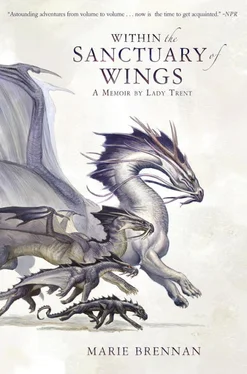Would they have been able to make out the houses and farmland below? Perhaps; perhaps not. Certainly they would not have known the inhabitants were Draconean—not without landing in the Sanctuary, and people surely would have said something if they had. The caeliger was not here to rescue me, for everyone believed me dead; nor was it here to investigate the mysteries of this place. It was here because its pilots had seen a relatively hospitable-looking region, beyond the edges of the Tser-zhag king’s control. Of course they wanted to investigate further.
Behind me, Zam snarled. In a voice so guttural I could barely make out the words, she growled, “ What is that? ”
“It is a—” My sentence died on my tongue. Of course there was no word for “caeliger” in their language. And what explanation could I give that would not simply describe what Zam already saw with her own eyes? The Draconeans did not even use carts, on account of the ruggedness of the terrain. I could hardly call it a flying yak. “It is like a basket,” I said, my voice faltering so much I am not even certain she heard me. “A basket carried by… the air.”
Ruzt’s reply was thick with tension. “Humans?”
“Yes.”
The caeliger veered off again. We all waited, every one of us on our feet, watching the col with fists clenched. The seconds ticked by with agonizing slowness; the caeliger did not reappear.
“They’ve given up,” Suhail said.
“For today,” I replied. “But when the winds are more favourable, they will try again.” Which could be as soon as tomorrow.
I pivoted to face the sisters. “When they bring that basket to earth, I must be there to greet it. If I am not…”
If I were not, then all the horrors I had envisioned might come to pass even sooner than expected.
In which the fate of the Sanctuary is decided
An unexpectedly swift return—A prayer to the sun—No sleep—Waiting for the caeliger—More reunions—A foreign nation—The mystery revealed
Catching a caeliger on foot is impossible even in the flattest terrain. In the Sanctuary of Wings, even to attempt such a thing would have been suicide, for I would have broken my neck thirty seconds into any sprint.
The only way to be certain I could greet the caeliger upon landing was to arrange for it to land in a place of my choosing. It was with this intent that I skidded back into Imsali, hard on the heels of Ruzt and Kahhe and Zam, and gasped out a desperate request for the brightest cloth or paint they could give me.
Suhail and Thu were not with us. I knew better than to charge into the village with two more humans at my back; that would only cause more alarm. And although I very much wanted the Draconeans to be suitably alarmed, the presence of my husband and our Yelangese friend was too likely to tip matters over from “suitable” to “excessive.” Eventually I must admit their presence… but not until I had explained the caeliger and what it portended.
Kuvrey’s last words to me had been that she hoped to see me again soon. Her next words were, “We did not expect you this soon. What is going on?”
I tried to let Ruzt explain, trusting her vocabulary far more than my own, but that did not work; Ruzt, of course, did not fully understand what the caeliger portended. Between the two of us, we got the point across, albeit in tangled and uneven fashion. The news that more humans were attempting to breach the Sanctuary did not go over well. The more warlike of their people—chief among them Esdarr’s sister-group, who had escorted me to the place of the elders—were in favour of meeting this incursion with knives and the short spears they used for hunting.
“You will die,” I said flatly, making no attempt to soften it. “They have objects that hurl spear points farther than any arm, so quickly that no one can hope to dodge them. If you threaten them, they will kill every last one of you, to protect themselves.”
Not long before, I had been assuring them that humans were not the murderous monsters of legend; now all that good work was undone. But I was willing to accept temporary damage to the reputation of my species in exchange for not provoking a confrontation that would guarantee even more hostility going forward. “I can keep them from hurting you,” I said, putting more confidence into the words than I felt. “But I need to be there when they arrive.”
“This was your plan all along,” Esdarr spat, wings spreading. “You led them to us!”
I cannot blame her for thinking so. In a sense, she was even correct: it was my decision to come to Tser-nga that had sent the first caeligers over the Sanctuary. The army would likely have tried that sooner or later, but they might have tried it elsewhere in the Mrtyahaima—not here. Not where it would threaten the Draconeans.
I turned to the elders. “Have you seen this before? Last spring, a little before the monsoon. Two baskets like that one. They would have come in over the river.”
“Someone in Eberi said they had,” Sejeat said. “But no one believed them.”
With the caeligers painted to blend with the sky, it was not difficult to overlook them—especially when no one expected such a thing in the air. “Those two sent for others,” I said. “Or they went astray, and this one has been sent to look for them. It hardly matters. This means more humans are coming; there can be no hope of a slow revelation now. And if I am not there to meet them, you will not be able to talk to one another, which will only make everyone more afraid, and therefore dangerous. Please —I beg you. Give me fabric or paint, something bright, so we can bring them down where we want them.”
My words were even more garbled than usual, fracturing under the strain of distress and difficult subjects, but by then Ruzt was accustomed to piecing my utterances together. “How will those help?” she asked.
I closed my eyes, trying to calculate how large an image must be for someone to reliably spot it from the sky. “I need to make a target.”
* * *
Sejeat was observant. In the short time I had been in the place of the elders, she had learned to read my moods well; now, in the kicked ant-hill that was Imsali, she took me aside and asked, “What are you not saying?”
I had known all along that I could not keep Suhail and Thu hidden forever. Had Sejeat not drawn me off, I would have done the same to her; the sisters and I had agreed that of all the people I could speak to first, she was by far the best choice. “You recall that I came to the mountains with companions,” I said, not bothering to prevaricate. “Two of them stayed the winter outside the Sanctuary. We met them in the col today, where they were looking for my body. They were with us when we saw the caeliger.”
Perhaps it was the consequence of piling shock upon shock; eventually one reaches a point where additions have little effect. Sejeat stared at me, as unblinking as a lizard. Then she turned and bellowed in a powerful voice for the scant handful of carrier mews that had not already been dispatched to the place of the elders.
These went out shortly thereafter with a postscript to the previous message. This done, Sejeat insisted that Kahhe go out and bring the two men down. I do not think she especially wanted to add them to the chaos of the village; but it would be worse if they were discovered by chance, or left to wander freely.
I will not trouble my readers with a detailed account of the furor that greeted them. You can imagine it for yourself; for the curious, it was a second menagerie come to town, and for the suspicious, it was proof positive that humans were coming to kill them all. I was grateful beyond words for two things: first, the presence of the two elders and Habarz, without whom I am sure the situation would have degenerated into violence; and second, for my husband’s fine memory. At one early point, while everyone else was shouting, he whispered into my ear, “Is there a religious leader in this crowd?”
Читать дальше












